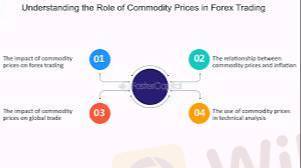
2天前
业内The Role of commodity prices in forex trends
Commodity prices play a crucial role in influencing forex (foreign exchange) trends because they impact the economic performance of countries that are major exporters or importers of specific commodities. Here’s how commodity prices affect forex markets:
1. Impact on Commodity-Exporting Countries
Countries that rely heavily on exporting commodities (e.g., oil, gold, agricultural products) see their currency strengthen when commodity prices rise.
For example, when oil prices increase, oil-exporting countries like Canada (CAD), Russia (RUB), and Norway (NOK) often experience currency appreciation.
A decline in commodity prices weakens these currencies as export revenues drop.
2. Impact on Commodity-Importing Countries
Countries that import commodities (e.g., Japan, India, and many European nations) see their currency weaken when commodity prices rise due to higher import costs.
If oil prices surge, currencies like the Japanese Yen (JPY) or Indian Rupee (INR) may depreciate because their trade balance worsens.
3. Inflation and Interest Rate Expectations
Rising commodity prices contribute to inflation, prompting central banks to adjust interest rates.
Higher interest rates attract forex investors, strengthening the currency.
Conversely, falling commodity prices can reduce inflation and lead to lower interest rates, weakening the currency.
4. Risk Sentiment and Safe-Haven Flows
Gold prices often influence safe-haven currencies like the Swiss Franc (CHF) and U.S. Dollar (USD). When gold prices rise, investors may shift funds into gold and out of certain currencies.
Commodity price volatility can also impact risk appetite, influencing forex trends.
#firstdealofthenewyearastylz
赞 0

Fato
Pialang
热门讨论
业内
哎,现在明白不赌就是赢啊
行情分析
美元/加元技术面
技术指标
外汇技术分析之波浪理论
业内
[活動]論交易,贏取200元話費補貼
技术指标
EZ.Fury Kite是基于趋势指标MA进行判断
技术指标
指标派是什么?
集市分类

平台

展会

IB

招聘

EA

业内

行情

指标
The Role of commodity prices in forex trends
 尼日利亚 | 2天前
尼日利亚 | 2天前Commodity prices play a crucial role in influencing forex (foreign exchange) trends because they impact the economic performance of countries that are major exporters or importers of specific commodities. Here’s how commodity prices affect forex markets:
1. Impact on Commodity-Exporting Countries
Countries that rely heavily on exporting commodities (e.g., oil, gold, agricultural products) see their currency strengthen when commodity prices rise.
For example, when oil prices increase, oil-exporting countries like Canada (CAD), Russia (RUB), and Norway (NOK) often experience currency appreciation.
A decline in commodity prices weakens these currencies as export revenues drop.
2. Impact on Commodity-Importing Countries
Countries that import commodities (e.g., Japan, India, and many European nations) see their currency weaken when commodity prices rise due to higher import costs.
If oil prices surge, currencies like the Japanese Yen (JPY) or Indian Rupee (INR) may depreciate because their trade balance worsens.
3. Inflation and Interest Rate Expectations
Rising commodity prices contribute to inflation, prompting central banks to adjust interest rates.
Higher interest rates attract forex investors, strengthening the currency.
Conversely, falling commodity prices can reduce inflation and lead to lower interest rates, weakening the currency.
4. Risk Sentiment and Safe-Haven Flows
Gold prices often influence safe-haven currencies like the Swiss Franc (CHF) and U.S. Dollar (USD). When gold prices rise, investors may shift funds into gold and out of certain currencies.
Commodity price volatility can also impact risk appetite, influencing forex trends.
#firstdealofthenewyearastylz
赞 0
我也要评论
提问
0条评论

还没人评论,赶紧抢占沙发

提问
还没人评论,赶紧抢占沙发